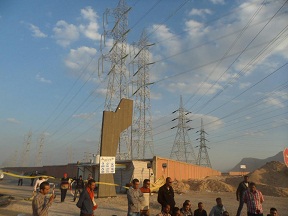 Now that the constitution has been approved by 64 per cent, no time should be wasted in excessive celebration or dwelling in pessimism. Egyptians have had their say, they do approve of the constitution despite some of its shortcomings and the fierce campaign against it.
Now that the constitution has been approved by 64 per cent, no time should be wasted in excessive celebration or dwelling in pessimism. Egyptians have had their say, they do approve of the constitution despite some of its shortcomings and the fierce campaign against it.
The constitution has been approved by many as Egypt does not have the luxury of prolonging such a transitional phase. However, the constitution was not a disaster as various politicians made it out to be.
Efforts must be put into place to help reconcile and alleviate the aftermath of the severe political polarization in Egypt. The attitude of the Egyptian public and the politicians who supposedly represent them, should not be dictated by a winner and loser attitude after this referendum. Ultimately, the results should be accepted and lessons learnt from experience.
Recently, Egypt has witnessed extremely devastating phenomena; violent protest clashes, death and opportunities for gangs to get involved. Chaos has struck some of the country’s smaller towns and cities with gangs taking over, abusing people and forcing money from them.
Political party buildings have been stormed and burnt and national institutions have been besieged and damaged. Both private and public properties have been targets of angry “protestors.” Mosques and Imams have been the targets of vandalism and violence. Political figures have also been targets of severe hostility.
Egypt has witnessed complete disregard to the value of honour, life, wealth and property; all under the guise of political positions and fuelled by polarisation and selfish politicians.
Those in power should learn to designate and be respectful, and the opposition should learn that those in power have been chosen by the majority of people and that not every decision taken by the ruling majority should be opposed.
Egypt still has parliamentary elections and later on, the Shura Council. In the coming months, all that has been witnessed thus far needs to be avoided, after all elections are scheduled to take place in two months’ time.
Egypt is still in a poor state but there is room for various political trends to participate in alleviating and improving those conditions. Egypt is still rampant with corruption and remains in a poor economic standing; laws need to be put in place for better regulations. For the opposition it is not the end of the world, and for those who wanted the constitution there is still a lot of work to be done.
It is a good idea that politicians from different parties immediately start dialogues and agree to basic ideals that no one would oppose, ideals that involve condemning and actively helping prevent phenomena mentioned above. This national consensus of fair political play should pave the way for political stability, urging security and ultimately strong institutional buildings and economic growth.
Eventually, this national unity should have mutual respect and a continuous communication with all political factions. It should lead to the respect of national institutions and democratic legitimacy. The gap between politicians should be reduced; this should also be made at the grassroots level; that would push political leadership toward this communication and dialogue. In the past there have been many youth initiatives that symbolised Tahrir Square as a place of unity regardless of political background and thought. Such initiatives should be revived and encouraged.
Political leadership should not be a goal in itself, at least in principle. Ultimately, the goal of politicians is to mirror aspirations of the masses and improve standards of living. Serving Egyptians is not exclusive to those who hold office. The arena should be open to civil society organizations and NGOs (Non-Governmental Organisations) that can oversee politicians and if necessary, hold them accountable before the public.
People like to elect politicians who have achieved something, those who can improve the day to day lives of common Egyptians. Egypt now, unfortunately, is a junk yard. The playground is open for anyone to do something constructive which will stand out. It is not as though Egypt has numerous ongoing positive activities that one who is striving for political significance will only standout by creating something unique. In the coming months any economic initiative will be unique.
It is commonly said that Islamists do not have experience in governance, perhaps a good reason why the decision making process has been very shaky in the last few months. Similarly, liberals have no experience of a constructive opposition maneuvering in a free environment. Thus, even when concerns are legitimate they are obscured by their poor presentation and lack of political consistency.
It is a good idea that politicians refresh their intentions these days, and ensure their actions do serve the public good. You can fool some people sometimes, but you cannot fool all the people, all the time.




